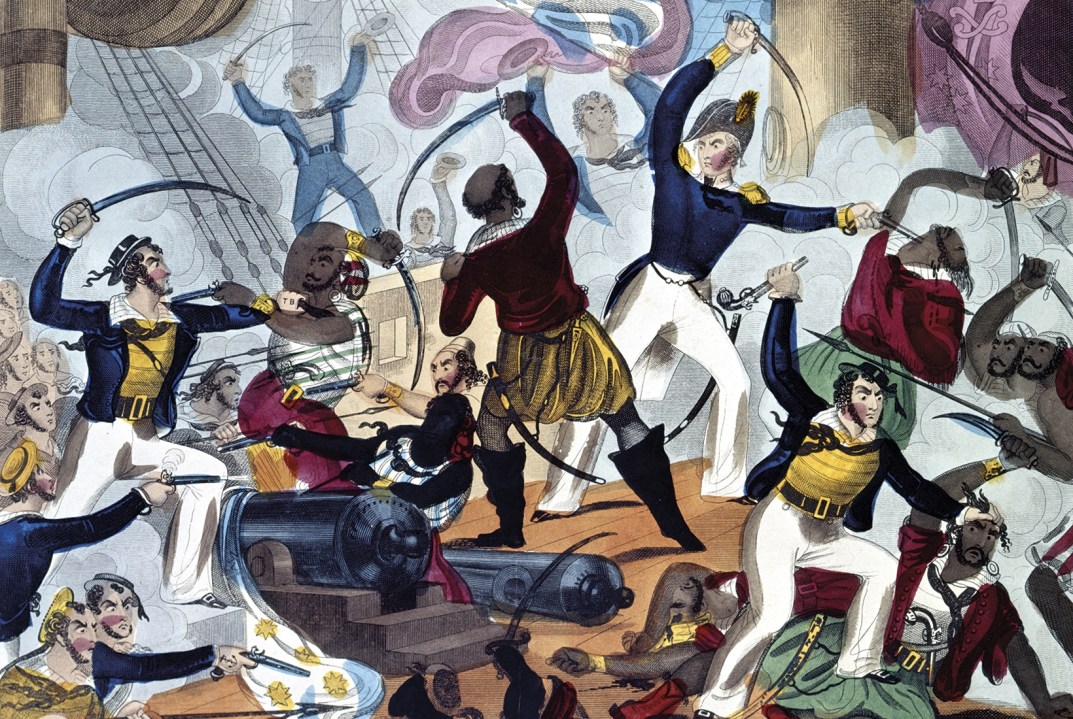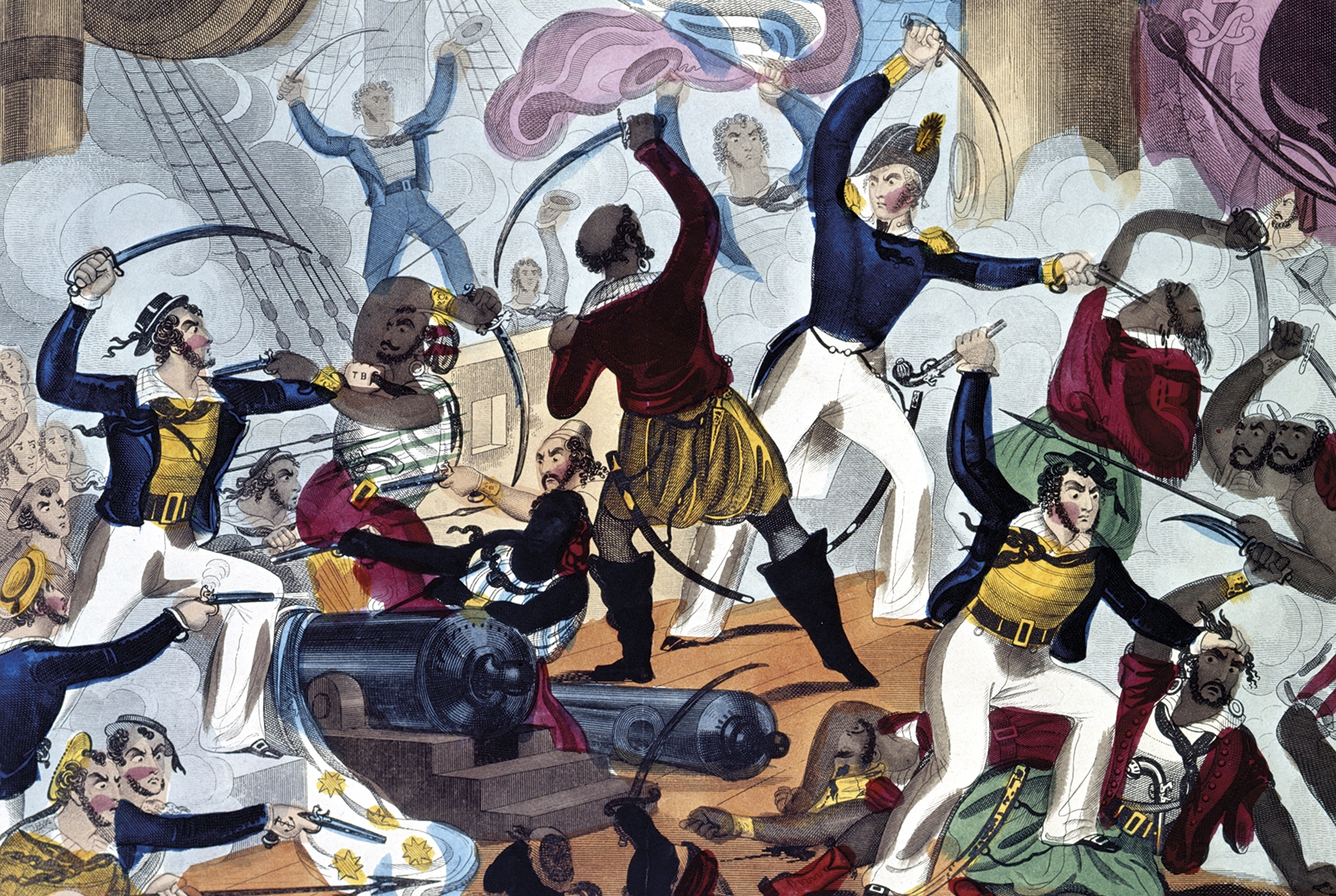Seafaring and the rule of the waves — as the song would have it — was an integral part of Britain’s sense of identity for centuries, a fire in the national imagination arguably first sparked by the exploits of Sir Francis Drake and the defeat of the Spanish Armada, rising to full flame with the Battle of Trafalgar and the expansion and consolidation of the Empire, and finally dwindling to embers as imperial ambitions failed and ownership of the seas passed to the United States. It’s a story often told, and known almost too well.
But this is not the story that the journalist-historian Stephen Taylor tells. Rather than taking seafaring and naval capabilities as a given, and then asking how these phenomena shaped Britain’s destiny, in Sons of the Waves Taylor looks instead at the common seaman and his officers during the 100-year zenith of the country’s sail-based power (roughly between 1740 and 1840), seeking to convey what such men were like, and what they experienced.
In this period, the archetypical seaman was often referred to as Jack Tar — the second word deriving from the tar with which sailors would cover their jackets in order to enjoy a level of waterproofing in bad weather. Jack may have been ‘pressed’ into service — a technique of recruitment relying more on cudgel-wielding gangs of men than on persuasion — but, as Taylor emphasises, he was just as likely to have volunteered, drawn by the lure of treasure or the excitement of adventure (or spurred by its converse: the fear of drudgery on land). After a hard winter, recruits might show up in port simply in the hope of getting regular meals. Those who stayed in the profession, though, and willingly returned to hazardous duty, often had a certain spirit. An officer in the West Africa squadron wrote:
Jack fights for the love of it, just as he is wont to do, being a pugnacious kind of animal, fond of a little excitement to vary the monotony of his life… and to add another tale to the string of yarns he has to spin.
There are glimpses of horror, especially of the ravages of scurvy: ‘Some lost their senses… some rotted away’
Jack was a participant in cultures that were, effectively, nested inside one another. The crew of a ship was divided into ‘messes’, each a group of eight seamen who would eat at the same table and over time become as distinct as families. An individual ship, meanwhile, had its own disposition, ‘not only her sailing qualities and comforts, good or ill, but a curious blend of common experience, folklore and superstition by which she became defined’. And at the widest level, the trade itself set its practitioners apart from their ground-based countrymen: in how they dressed, walked, spoke and behaved, British sailors were as distinct as Catholic priests.
Taylor uses memoirs, diaries and letters to let seamen and officers speak, as far as possible, for themselves. Usually plain, though sometimes literary and poetic, their words conjure visions for us. Some are glimpses of all-too-frequent horror. A captain on Commodore George Anson’s gruelling circumnavigation carefully logged the effects of scurvy on his crew: ‘Some lost their senses, some had their sinews contracted in such a manner as to draw their limbs close up to their thighs, and some rotted away…’ Others offer intimations of the sublime: in a high wind, wrote seaman (and later actor) Charles Pemberton, ‘the whole sea was alive — as one vast spirit… tossing its mighty arms aloft and sweeping its hands across the verge of the horizon as if to crush the feeble intruder’.
Yet that intruder, far more often than not, survived the sea’s fury. For as much as the power of written language may impress us in our own less physical era, Taylor’s work makes clear that it was the personal character and sea-learned ship skills of mostly unlettered sailors and their officers that made the difference between success and disaster. This character was often complex: the same sailors who would enthusiastically climb 100 feet above a pitching deck to work the sails in violent weather might well, in an even more dire situation, surrender to ‘Jack’s instinctive response to the seemingly inevitable, which was to drink himself into oblivion’.
Similarly, Lieutenant Edward Riou, who was initially — and not without justification — despised as a controlling, hard-punishing ‘terror to seamen’, turned out to be exactly the kind of determined and hardy leader his sailors needed after his ship, the Guardian, was holed and then enmeshed in Antarctic ice. After weeks of desperate repairs as frigid water flowed in and had to be continuously pumped out by hand, the officer and his remaining men managed to get underway again and sail 1,200 miles to the Cape of Good Hope.
Such episodes — and Taylor’s book is full of them — are gripping to read and fascinating in their particulars. More importantly, however, they are convincing evidence that the power and wealth of 18th- and 19th-century Britain depended not only on its system of rule, its natural resources and its technology, but also, perhaps mainly, on the character, skills and virtues of its people —Jack Tar foremost among them.







Comments